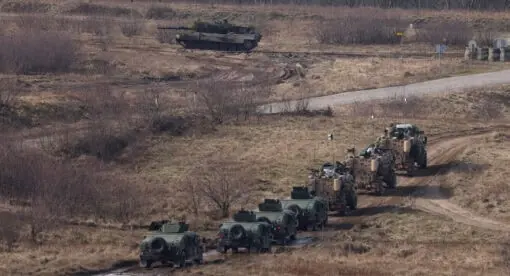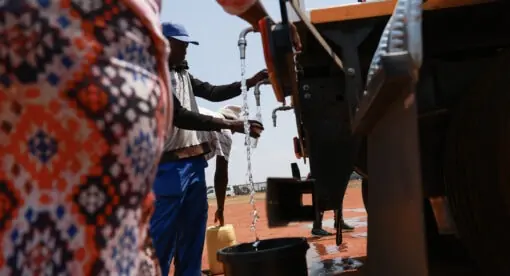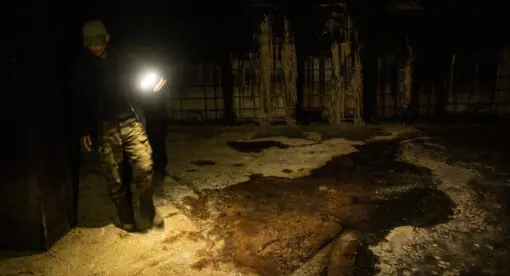China wants to develop economic, diplomatic and security relationships with Syria – a goal that poses a serious challenge to U.S. influence in Syria and the region.
China seeks to integrate Syria into its Belt and Road Initiative (BRI), leveraging the country’s dire reconstruction needs to establish a foothold in the heart of the Levant. This could enable China to further project influence into the Middle East and the Eurasian landmass, potentially facilitating a Chinese naval outpost in the eastern Mediterranean and helping extend its reach toward Europe. In the long run, this could challenge the U.S. position in Syria and the Levant more broadly, and constrain NATO and allied militaries strategically in the Eastern Mediterranean. A U.S. strategy for isolating the Syrian regime economically and diplomatically must include contingencies should China’s presence in Syria grow.
The BRI and China’s Ambitions for Syria
The BRI is a land and maritime transportation corridor investment project, signed onto by 130 countries, aiming to connect China to Eurasia, Africa, Europe, and Latin America. The World Bank estimates China’s current BRI-related spending at $575 billion, and experts forecast up to a total of $1.32 trillion in the 2020s. There are questions about BRI’s financial sustainability, and Beijing faces backlash over China’s use of development funds to gain political influence as well as BRI’s questionable compliance with global environmental, labor, and technical standards. In 2018, China’s BRI investments dropped by $100 billion in each region globally, with one exception: the Middle East and North Africa. China is the world’s largest importer of the Middle East’s oil, and the region intersects with global trade and sea routes. Beijing sees the region as an important, growing market. China prioritizes the region’s development and pledged $23 billion in loans and aid at the 2018 China-Arab States Cooperation Forum. President Xi Jinping’s 2016 “Jointly Create a Brighter Future for China-Arab Relations” speech outlined China’s value proposition to the Arab world: investments and strategic partnerships without pressure to address human rights and governance issues.
An Aug. 5, 2018 letter by Chinese Ambassador to Syria Qi Qianjin signaled China’s intent to expand its economic, political, and military footprint in Syria. The Syrian government, in need of reconstruction funds, has been publicly courting China’s support. As Syria enters the next stage of its nearly decade-long civil war, China knows it can rely on a friendly Syrian government to help achieve its geopolitical and geoeconomic goals in the Levant, including the accumulation of regional influence at the expense of the United States.
China’s Plans for Syria Defy Washington
Syria fits into China’s economic re-engineering of Eurasian political and security ties via the BRI. A former node of the historic Silk Road, Syria provides a convenient connection to the Mediterranean Sea. The United States would need to counter plans for a Chinese industrial city or port investment near Tartus or Latakia. At a minimum, the Syrian coast will be in play for China’s envisioned “industrial park-port interconnection” connecting the Persian Gulf, the Arabian Sea, the Red Sea, and the Mediterranean Sea via Chinese port investments in the Gulf, Egypt, Djibouti, and Israel. Should Beijing entrench itself commercially in the region its next step would be to pursue a military strategy. China has stated its prioritization of “far waters” in its maritime strategy of “offshore waters defense and open seas protection.”
If there is no change in the political and diplomatic status quo, Syria’s massive reconstruction financing needs can only be met by China. Deeper and broadened U.S. sanctions on Syria advanced by the Caesar Syria Civilian Protection Act (2019) serve as a deterrent to doing business with Damascus. But China has built leverage against U.S. sanctions and is developing its own, parallel multilateral financial and development institutions that can use Chinese public-private partnerships to produce the lion’s share of the estimated $400 billion reconstruction costs. More than 200 Chinese companies attended the 2018 Damascus International Fair, and Chinese telecommunications, oil and gas, and transportation sectors have begun exploring investments in Syria’s fledgling infrastructure. Fifty-eight Chinese companies attended in 2019, undeterred by sanctions warnings by the U.S. Department of State. Helping rehabilitate the Syrian Arab Army could also boost Chinese arms exports. Stabilizing Syria will be critical to protecting and advancing China’s investments in the region.
China’s Syria policy reflects Beijing’s long-standing approach to humanitarian intervention and the Responsibility to Protect, which Beijing views as an infringement on state sovereignty. From the outset, China has sought to block any attempt to engage in what it views as Western powers’ attempts at regime change in Damascus. To these ends, China has used its veto power in the U.N. Security Council six times alongside Russia to block condemnations, calls for ceasefires, and sanctions on war criminals. There should be no expectation of this change. In May 2018, China hosted an “International Symposium on the Prospect of a Political Settlement of the Syrian Issue,” in an attempt to take leadership in the diplomatic process in Syria. While China’s Syria Envoy Xie Xiayoan reaffirmed China’s support for UNSC Resolution 2254 (2015) and the Geneva peace process for Syria, China’s promotion of the Geneva process is to tout China’s role as a peacebuilder and to reaffirm Syria’s unity and sovereignty pursuant to UNSC Resolution 2254. With the perception of no blood on its hands in Syria, China can leverage soft power to build trust among pro- and anti-government actors in tandem with regional actors.
Beijing’s Counterterrorism Narrative
China’s strategic and tactical alignment with Russia seeks to fill vacuums across the Eurasian landmass under the pretext of counterterrorism. The security vacuum existing in Syria since 2011 has increased the threat of transnational jihadism on China’ frontiers. Syria has evolved into an important node in transnational jihadism, and these networks are likely to target Chinese assets globally in response to Beijing’s treatment of China’s Muslim minorities. Members of the East Turkestan Islamic Movement (ETIM) fight alongside al Qaeda-linked elements in Syria, and there have been Uighurs identified among Islamic State ranks. Beijing’s domestic and international counterterrorism narrative has provided China the pretext for its current demographic re-engineering campaign among ethnically Turkic Uighurs in China’s northwestern region of Xinjiang. Whereas U.S.-led forces continue to combat ETIM assets fighting alongside the Taliban China has sought to advance a strategic narrative stating that stability in Syria would stem a significant source of domestic jihadism, and that this stability can only be achieved under Bashar al Assad.
In practice, China has supported Russia’s military intervention in Syria as well as the subversion of Geneva peace talks by the Astana Process. The Astana Process has enabled the Syrian government to solidify and build on its territorial gains. Moreover, China does not support the political transition outlined in UNSC Resolution 2254. Under the guise of countering Uighur jihadism in Syria’s northeast, China may increase its military presence, as suggested by Ambassador Qi, though this might be a long-term aim that Beijing ends up finding difficult to accomplish. There is also the prospect that China could be brought in as a fourth guarantor state in the Astana Process.
China has already bet on Iran, Russia, and Turkey as an alternative to a U.S.-led Middle East, but only China has the resources to organize and address the diplomatic, military, and humanitarian dimensions of the Syrian conflict. Moreover, Syria provides a low-stakes, high-reward testing ground for China, and an opportunity to demonstrate its ability to be a peacemaker and guarantor of regional security.
A constraint on China may be that it has bet on the wrong regional partners. Russia’s economic constraints and the international pushback that Moscow faces could hamper Russia’s ambitions in Syria, and Moscow might not want to lay the foundation for Chinese dominance in Syria after all Russia has invested in the Assad regime’s survival. Iran faces regional pushback by popular protests in Iraq and Lebanon, as well its usual regional adversaries in the GCC and Israel. With the United States’ killing of Iranian Gen. Qassem Soleimani, Iran has also lost the architect of its regional strategy and a respected interlocutor between Iran and its allies.
However, the Syrian government may be eager to wrest control of the Syrian military and economy from Russia and Iran. To these ends, Beijing is valuable to Damascus. However, questions remain as to whether Beijing would invest enough political capital in Syria, and whether China’s involvement in Syria may tarnish its soft power in the Arab world or cause domestic blowback should China draw more ire for its human rights record on the international stage. Unlike Iran, which is of more immediate strategic significance to China given its dependence on Middle East oil, Syria’s risks may outweigh the benefits to Beijing. And as in the case of Iran, evading U.S. sanctions, even with multilateral support, will prove difficult.
Policy Recommendations
The United States has robust economic and public diplomacy options available to at a minimum, contain, and at best, shape Beijing’s Syria footprint. This should be centered on increasing the risk for Chinese companies investing in Syria and in regional companies doing business in Syria. Punishing any and all regional businesses with sanctions should they do business with Damascus will deprive Chinese businesses of regional reconstruction partners. Washington can expand the scope of sanctions to include Chinese state companies investing in Syrian state entities, along with Chinese military entities deployed to Syria. An example should be made of Huawei for its pledge to rebuild Syria’s telecommunications capacity. Expand U.S. Commerce Department blacklisting of Chinese companies involved in human rights abuses and U.S. Department of State visa restrictions on Chinese government officials involved in human rights abuses to include Chinese entities and individuals doing business in Syria.
Policymakers can invest in the U.S. Agency for Global Media’s capacity to broadcast Middle East Broadcasting Networks programs into Syria and expand the U.S. Global Engagement Center’s Arabic-language programming to counter Chinese propaganda in the Middle East. This will be critical to countering China’s development-sans-human rights message in the region. Investing in the agencies’ Chinese-language programming critical of China and Russia’s policies in the Middle East and critical of the Syrian government will be key to undermining Beijing’s counterterrorism and peacemaking narrative at home.
Lastly, and most importantly, Washington must work to ensure Europe and regional partners do not continue to create an international political and media environment permissive of Syrian reconstruction without a political solution. Global weariness over migration has led to U.S. partners relaxing their line on Syria, opting for repatriating refugees and holding premature discussions on Syrian reconstruction. The United States must uphold international law as it relates to forced repatriation, and must assert support for the Geneva peace process and the fulfillment of UNSC Resolution 2254 in Syria.
Adham Sahloul is a foreign policy analyst based in Washington, D.C. He has worked on Middle East policy in the think tank community as well as in the humanitarian field. His work has been published with the Atlantic Council, Axios, Lawfare, and The Diplomat. He has an M.A. in international security and political economy from the Fletcher School of Law and Diplomacy. He Tweets at @AdhamSahloul.






